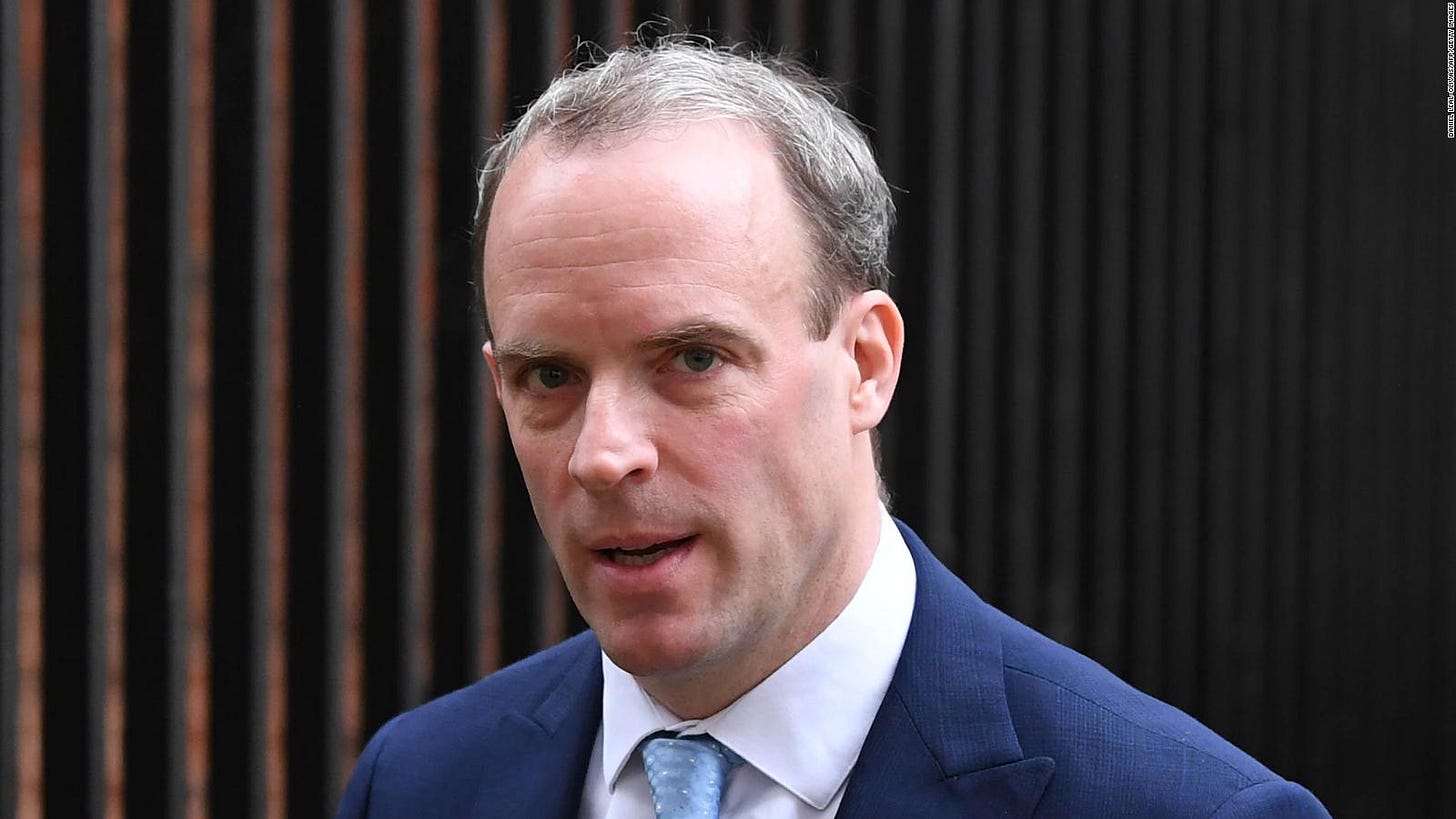16. Gatekeeping, boundary setting and Dominic Raab
Ideas from Host Leadership about how leaders can ask for, and accept, hard work and tough challenges
Over the past week the UK news has been full of the case of Dominic Raab, a high-ranking Conservative minister who has resigned over accusations of bullying in the workplace. This is such a key issue for organising both humanely and effectively, the topic of this Substack, that I feel I can’t ignore it. However, rather than simply state again that Raab is a spectacularly unsuccessful leader of others (spoiler alert: he is), I want to look at what he says about his leadership style and see how something like it might actually be accomplished using the Host Leadership framework. There are some good lessons for us all in this.
The case of Dominic Raab
Dominic Raab was elected to parliament in 2010 having worked as a solicitor (lawyer), including for the UK government. A prominent campaigner for the UK to leave the European Union during the 2016 referendum, Raab was made Secretary of State for Exiting the EU (‘Brexit minister’) in July 2018 following the resignation of his predecessor. He in turn resigned in November 2018, dissatisfied with the UK government’s position. A supporter of Boris Johnson in the 2019 Conservative leadership context (after he himself was eliminated early on), Raab was rewarded with the key position of Foreign Minister. He deputised for Johnson when the prime minister was hospitalised with COVID during the pandemic.
When the USA withdrew from Afghanistan in August 2021, Raab was widely seen to lack leadership by staying on holiday in Greece; he was forced to return to oversee the chaotic withdrawal of UK forces. Raab was demoted to Justice Minister in November 2021, where he took an interventionist position on prisoner release (being mostly against releasing them) and embarked on a UK Bill Of Rights which, despite its title, aimed to restrict the ability of UK citizens to enforce their human rights.
There were whisperings about Raab’s modus operandi with civil servants over the years, that he took a bullying and hectoring manner to subordinates who became reluctant to meet him and work with him. However, without a formal complaint it seemed that nothing could be done. The first formal complaints about Raab’s conduct emerged in November 2022, when prime minister Rishi Sunak set up an inquiry by leading lawyer Adam Tolley KC at Raab’s behest. Tolley was asked to establish the facts of the cases. Bullying is against the Ministerial Code, the code of conduct for ministers set out (and enforced) by the prime minister. Ministers who break the code are normally expected to resign. However, ‘bullying’ is not formally defined in the code. Raab said he would support the investigation, denying the accusations and saying that if found guilty he would indeed resign.
The Tolley report took several months to complete, during which time other allegations of inappropriate behaviour emerged. Top civil servants said that Raab’s behaviour has been ‘demeaning and aggressive’ to staff, and that he had a ‘controlling’ manner. Some civil servants were signed off work with stress. Raab said that he had behaved professionally at all times, and that he was upholding high standards of performance. The report investigated eight cases against Raab and upheld two of them. Raab resigned on 21 April 2023. In an unusually outspoken resignation letter to the prime minster, he stated his view that the findings were flawed, that he had sought to ‘exercise direct oversight’ and ‘give direct critical feedback’, and that the bar for bullying has been set so low as to encourage spurious accusations and have a ‘chilling effect’ on ministers’ ability to drive change. He expanded on this position immediately afterwards in an article for the Daily Telegraph, saying the the British people would ‘pay the price’ for such laxity.
Gatekeeping and the negotiation of boundaries
“Hospitality is about the crossing of thresholds, the reimagining of boundaries and the creation of space.” Mary David Walgenbach OSB
My work on how to lead as a host, not a hero (or even a servant) has made me aware of the importance of boundaries. Hosts (and host leaders) are good at establishing boundaries - points where the rules change. These boundaries are often negotiated with the people concerned. Hosting goes along with space, and when we step into a host’s space we are invited (sometimes compellingly) to follow their ‘house rules’. The moment of crossing the threshold, the way into the space, is a key moment; we start to become aware of how this space is different to outside and how things work here. A good host leader will give some early steers on this as we enter.

Establishing some ways of working and being together is a key part of leading. Every organisation and workplace has its own ways; these are often spoken about as ‘organisational culture’. I like the shorthand of ‘how we do things here’ – ‘doing’ draws attention to how these rules and norms are enacted every day, whereas ‘culture’ sounds much more permanent and hard to change. Be in no doubt, these norms can be seriously hard to shift, particularly once they’ve become established. And they are often not stated but implied – it has been said that organisational culture is ‘caught rather than taught’. We pick it up and start acting along with it perhaps even without noticing, and once we’re in it, it becomes the norm and expected.
Host leaders are more adept at making these norms explicit and negotiated. Once these things are public, they are easier to ‘enforce’ (encourage folk to play along). And – a key point – they apply to all in the space, including the host. Imagine asking your guests to take their shoes off upon entering your carpeted home. If you yourself are in slippers or socks, it’s fine. But if you make the same insistence in muddy boots, it looks, well, odd. There can of course be exceptions, but by and large it’s much easier for people to follow the rules if everyone’s doing it. If the host isn’t following their own desired rules, we might expect them to at least acknowledge it.
“Rigorous oversight, direct critical feedback and driving change”
In his resignation letter and Telegraph column, Dominic Raab demands the right to engage in rigorous oversight and giving direct critical feedback, all as part of driving change. He says, more or less, that he expects high standards both of himself and from those around him. So far, so good. Establishing ways of working where these things were expected, delivered, supported and jointly produced would make for an energetic and demanding workplace. And indeed, the Ministerial Code sets out boundaries (albeit imperfectly) for precisely this context.
However, a close reading of the texts reveals that Raab seems to regard himself as the sole person who can demand these things. He wants to provide rigorous oversight – but the moment someone does this to him (Adam Tolley KC in this case) he rails against it. He wants to be able to give direct critical feedback (in the form of aggressive, humiliating, intimidating and even punitive terms, to quote Tolley’s report) but the instant someone else gave him feedback (be they senior civil servants or Tolley himself) he either ignores it or rails against it. He wants to drive change, but when those he works with want change (in him and his policies), that’s unacceptable obstruction.
Sharing power, sharing norms
In my view, this case boils down to someone who insists on his right to work in a certain way, and then withholds the right of his civil servants to do the same. It’s a view of leadership as domination rather than co-operation. This would not be news to Vladimir Putin, but should not be the norm in western democracies. Raab would say that he has been elected, and his civil servants are there to enact his policies. True. But the way he has gone about it has been as ineffective as it is unreasonable. Having been sacked or resigning under a cloud from every ministerial post is quite an achievement.
Raab is not, of course, a host leader. If he were, he would seek to ensure that his people had what they needed to do their jobs (and therefore produce acceptable work), shared his policy aims (or at least understood the rationale behind them) and were not interrupted by him with unconstructive and abrasive comments, but heard, supported and encouraged. Raab seems to think that such a management style would be the death of the country. He’s wrong, as anyone who has observed the trajectory of management practice over the past several decades will attest.
All in all, the Raab affair is a great lesson in how not to get things done. And for that, at least, we might be truly thankful.
Dates and mates
Come and join, learn and share about Host Leadership at our 2023 Gathering in Vienna, Austria on 12-13 June 2023. I’ll be there and looking forward to meeting you.
Next Wednesday it’s SF World Day when the Solution Focused community (including lots of coaches, consultants and managers) celebrates the original publication of Steve de Shazer’s seminal paper The Death Of Resistance in 1985. I’ll be writing about the paper and why it’s still critically important and relevant next week. On the same day there is also a free webinar with two of my favouite colleagues Susanne Burgstaller (Austria) and Chris Iveson (UK). ‘Happy Teams In Happy Organisations - with Solution Focus’ is at 5pm-6.30pm on Wednesday 3 May. Register via the Meetup page. Susanne and Chris are co-authors of the book Team Talk: Building Excellence with Solution Focused Skills.
The annual Jane’s Walk festival is celebrated around the world on 5-7 May 2023. Jane’s Walks encourage people to share stories about their neighbourhoods, discover unseen aspects of their communities, and use walking as a way to connect with their neighbours. The event is named in honour of Jane Jacobs (1916-2006), American-Canadian urban activist who championed a community-based approach to city-building. There are neighbourhood walks all over the world. I am organising Jane’s Walk Edinburgh 2023, where we have five walks over the weekend. Look around to see if there’s a Jane’s Walk near you.








This an object lesson in finding a pearl in the mud.
Raab is a classic narcissist. Bullying, controlling and can never, ever admit he’s wrong - because to admit that would cause his entire world to crumble. They are the most dangerous people on the planet, but unfortunately often end up as political leaders because they’re seen as ‘strong’, ‘determined’ and ‘unwavering’.
Horrible man. We’ll see him on GBNews soon, probably.